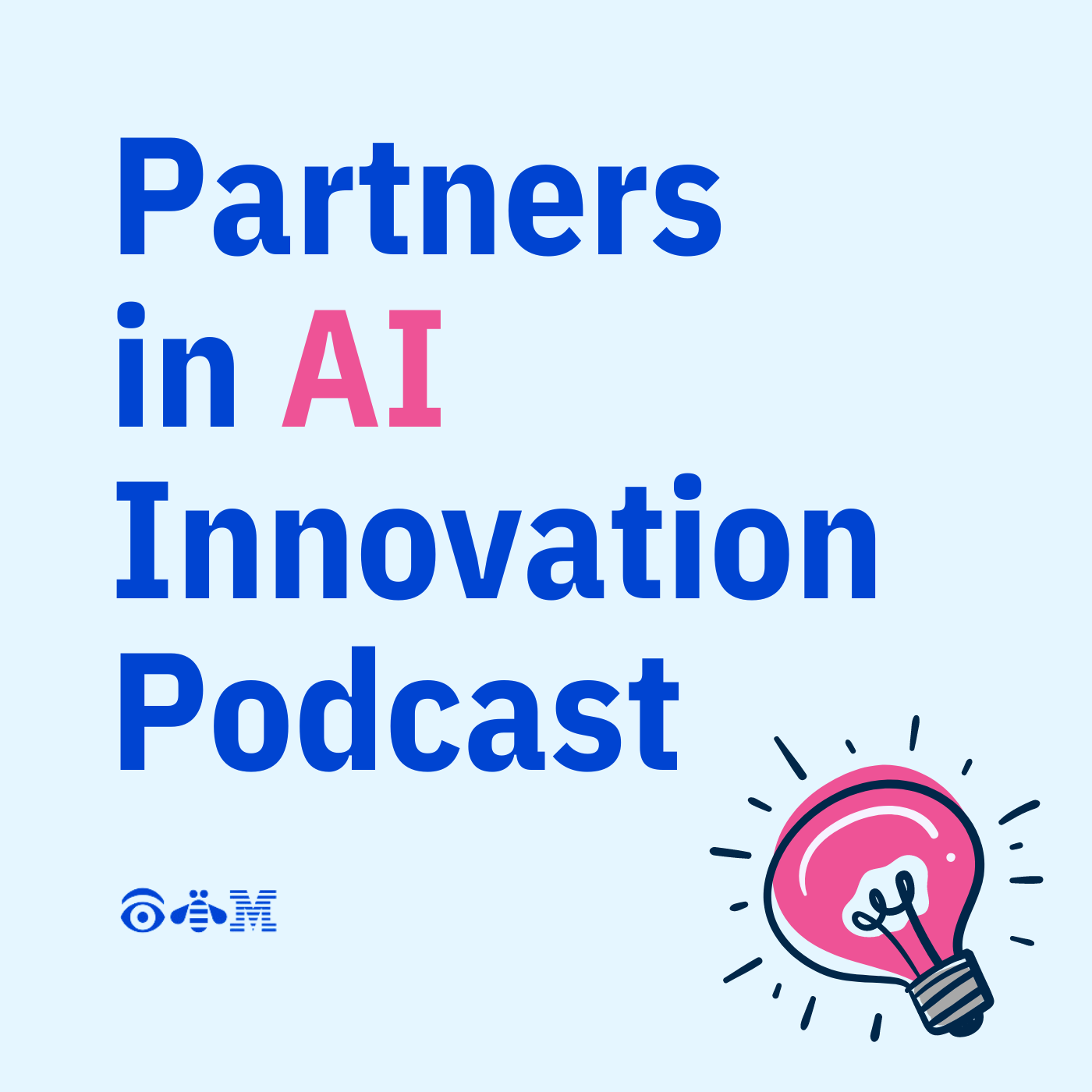Unlocking AI Innovation: A Partnership Journey with Migrato and IBM
- 0.5
- 1
- 1.25
- 1.5
- 1.75
- 2
Host: Welcome to IBM Partners in AI Innovation. This is a unique podcast that focuses on two areas of how artificial intelligence is being put into practice. First of all, how ecosystem partners across Europe, Middle East, and Africa are playing a role in innovating around AI, and then secondly, how they're doing so with trust and responsibility. Joining me today on the podcast is Oscar Dubbeldam and Annika Dubbeldam. Oscar is the CEO of Migrato. Annika is one of the data scientists working there. Guys, welcome to the podcast.
Oscar Dubbeldam: Thank you, David.
Host: Okay, great. Oscar, first of all, as well as joining the podcast. I'd like to thank you because you're a new partner, who joined IBM Partner Plus last year. Thank you very much. Partner Plus, if you don't know the program yet, everyone, was our new program re- imagined at the beginning of 2023, so one year in as I speak to Oscar today. A lot of buzz, a lot of hype, a lot of success over the last year, particularly lots of new partners joining us. Delighted that one of those here is Migrato, but I wanted to zoom in here. Obviously, this podcast is focused on artificial intelligence, so I wanted to know a little bit from you, Oscar, how did you get started on your AI journey with IBM?
Oscar Dubbeldam: It started when I joined an event in the Netherlands organized by an IBM partner called Novadoc, where I bumped into an old Xerox colleague. He's working now with IBM, and he got engaged with me and he spoke to me and said, " I know what you're doing, and you should become an IBM partner." Then I was grabbing my inaudible and said, " As Migrato becoming an IBM partner, what do you mean?" We started an engagement early next year. He explained what the IBM Partner Plus program is, which is completely different than what I used to know about partner programs from American companies and says, " Okay, I'm going to join, because yes, what we do in Migrato is completely AI based."
Host: Fantastic. How did the experience start to you? I know that you were involved with some of our BuildLab team, who are a specific team focused on working with partners to embed artificial intelligence, IBM's AI into your partner solutions.
Oscar Dubbeldam: We first went to an event in IBM Amsterdam, which was presented by IBM colleagues over there, and they taught us in one day that it should be possible to create more or less an integration between IBM NLP stuff, and our application. Guess what happened? It could be done more or less within that one day, so we got enthusiastic and I said to Yost, the IBM colleague in the Netherlands, " This is what we need, can you help us?" More or less at exactly that moment, the BuildLab was becoming alive, and said, " We have a great opportunity for you. We engage you with the BuildLab." I have no clue what the BuildLab was, but we start an engagement, and off we went with Annika and some other colleagues for one week, and it happened.
Host: Can you tell us a little bit about the solution there? How did the IBM technology fit into, complement what you were already doing?
Oscar Dubbeldam: The Migrato solution is much bigger than what we currently do from integrating the IBM component. We start with a company, an organization which has sometimes thousands, hundred thousand, millions of documents residing somewhere on the network drive, all document management system, all digital archive or whatever it can be. They are facing regulations like, you have to clean up, you have to, oh by the way, we are going to the cloud, so can you reduce more or less your storage a little bit? We hardly know any more what we have in all those documents, so we build an environment where we can clean up, deduplicate, classify, meta, engage with metadata for all those documents. Yes, one of the laws in the Netherlands is also you need to be able to cope with the privacy law. You need to identify those documents which are privacy critical. That's where we got the engagement starting, because what we saw from the IBM perspective is that they have very great natural language processing AI embeddable tools. A long sentence, but it's what we needed. We needed those tools to more or less take the next step in our software development to help our customers.
Host: Actually, it's a big theme of our podcast, and looking at how do you bring AI into real world business applications, but do so responsibly, and obviously with trust? That whole area of data privacy is such a critical issue. We know pretty much across every country, particularly in those countries who are on the EU regulation, so incredibly important here. You're a relatively small company. IBM's a little bit bigger, so people may be listening out there and thinking, " Well, okay, I'm a small company. I deal with IBM or a big company, and I'll get lost here," but could you tell us a little more about the actual practical experience?
Oscar Dubbeldam: Yes, we are a small company in number of employees, and we got that question many, many times. We also answer it also a little bit differently. We are not counting our employees. We are counting the number of laptops we have running for you, or for our customers in the Netherlands. Usually, we have multiple laptops running to do the classification to clean up all those stuff, because it's somewhere in the cloud, and it needs to be on premise, et cetera. We have hundreds of laptops running. In essence, all those laptops is maybe one employee.
Host: Yeah, okay. That's another way of thinking about size. Yeah, no, fair enough. Fair enough. But it was your first experience working with IBM.
Oscar Dubbeldam: Yes.
Host: What would you say to a prospective new partner who might be listening in today, that might be thinking, as you were, " IBM, what should I do with them?"
Oscar Dubbeldam: What made the trick for us in becoming an IBM partner was the IBM Partner Plus program. The presentations we got in the beginning also usually in the Netherlands, say, " IBM is changing." IBM is changing from what I used to know from my old background, from a hardware reseller to a partner first initiative program. Yes, you saw it happening, and yes, when I asked questions to my colleagues or the IBM colleagues in the Netherlands, they responded, which was even not heard of. Yes, I also worked for two of those very large American companies, and I used also to work in the partner development environment in those companies, and I never responded to them, but this was different. They asked that I got a response, we got answers, we got a BuildLab, we got these programs, and that was incredible.
Host: I just want to turn to Annika for a second. Annika, you're a data scientist, right? I call data sciences, by the way, they're the rock stars of the AI era. Welcome to a rockstar here. Annika, How was your practical experience working with some of the IBM technical experts?
Annika Dubbeldam: Well, my experience mainly is with the BuildLab.
Host: Yeah, exactly.
Annika Dubbeldam: Looking stuff up online myself, there's a lot of websites for IBM. I did not know where to start, so I was very happy that we got to do BuildLab, because they just gave us a document of" follow these steps." They showed us, and I could recreate it myself. We had one hour in which they explained, and then I got to work after that myself, and if I had questions, I could email the BuildLab people directly and they would respond within 30 minutes. At the end of the week, we had actually more than we wanted, and actually the knowledge that I gained from that week, I've been reusing it now, because starting to look at what else can we do? What's there was more. It's actually been great.
Host: Well, fantastic. I think really the lesson here is, it doesn't matter how you might measure the size of the company. There's huge demand, and particularly in your case, you're looking at financial services, the insurance industry. There's huge demand from organizations to really understand how they can put AI into practice, but you've got to start with the hard work around the data, and all of the governance and trust that you need to put around that data. I think we also saw here the lesson, too, about co- creation together. Working with IBM experts in our BuildLab with you and bringing your skills, your knowledge, your existing customer base and expertise together with our technology and our experts, and we can create great things together. I think that's where the innovation comes in.
Oscar Dubbeldam: That's also a little bit of difference we have in Migrato is we know more or less the solution part. Yes, you know the technology. The technology should be great and it should be working, et cetera. But translating that technology into a solution which fits into a government body or insurance company, that's also a little bit make it special. That's what we do also in Migrato. We translate, more or less. We build technology, but we also know how to promote a market and deploy it.
Host: That's well said. That's a great place for us to end. Well said. Thank you, Oscar. Thank you, Annika for joining me today on the podcast.
Oscar Dubbeldam: Great. Looking forward to next time. See you. Thank you.
DESCRIPTION
In this episode of IBM Partners in AI Innovation, Oscar Dubbeldam, CEO of Migrato, and data scientist Annika Dubbeldam share their journey integrating IBM's AI solutions into Migrato's offerings. As a recent addition to IBM's Partner Plus program, Oscar recounts their initial encounter with IBM in the Netherlands and the subsequent collaboration. They discuss Migrato's use of IBM's natural language processing tools to address document management, data privacy, and regulatory compliance challenges.
Despite Migrato's size, they emphasize the value of IBM's support, particularly through the BuildLab sessions. The episode highlights the importance of responsible AI implementation and collaborative co-creation in delivering tailored solutions for various industries. Listeners will gain insights into the symbiotic relationship between technology and solution-oriented approaches, driving advancements in AI adoption while prioritizing trust and responsibility.
Today's Guests

Oscar Dubbeldam


